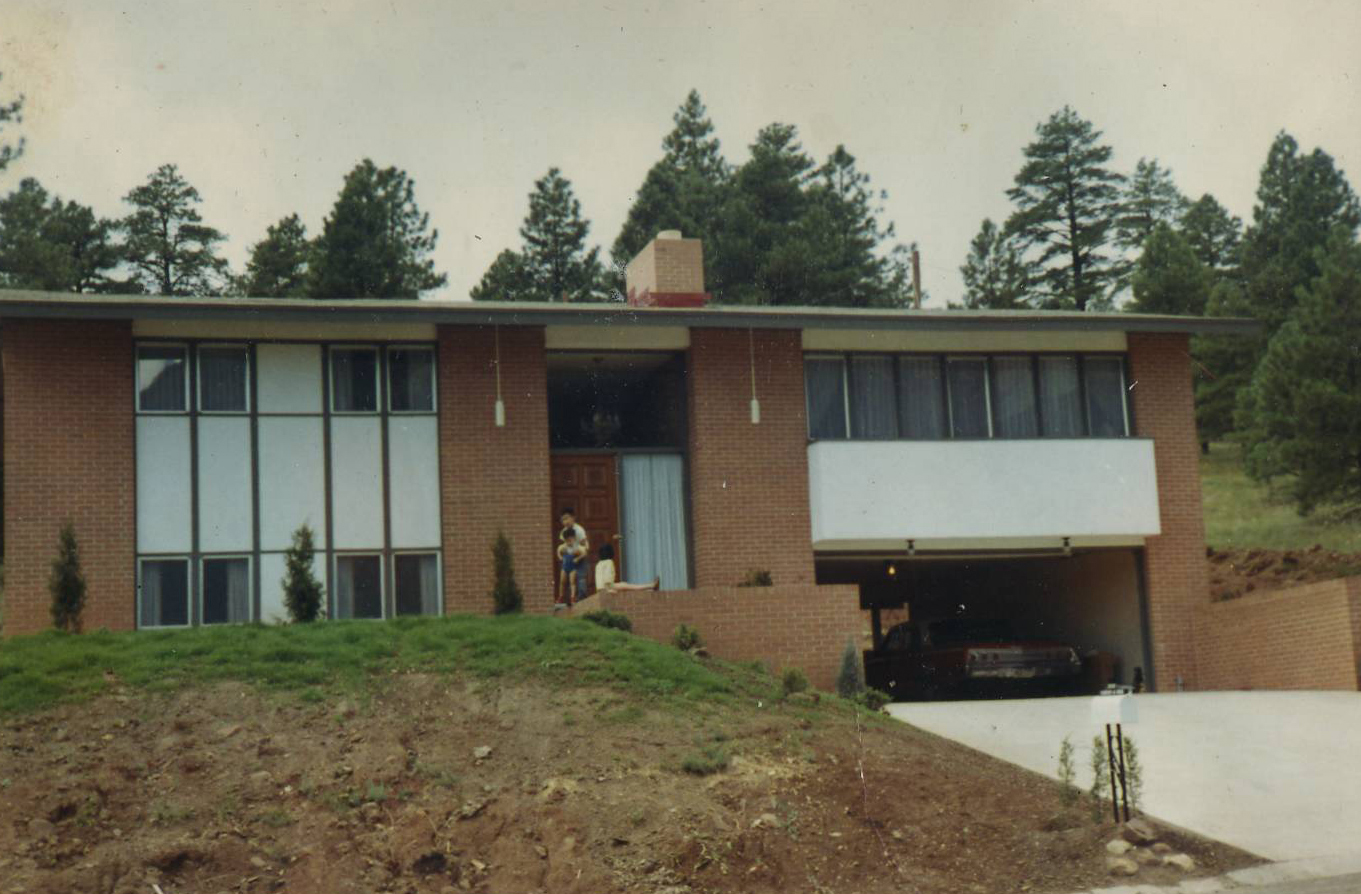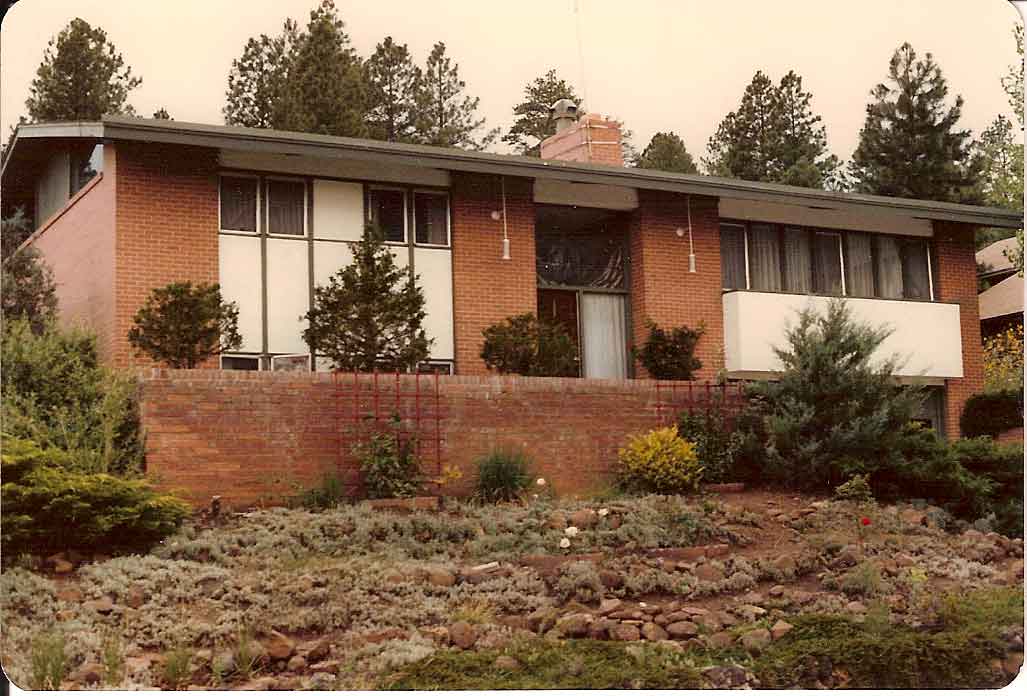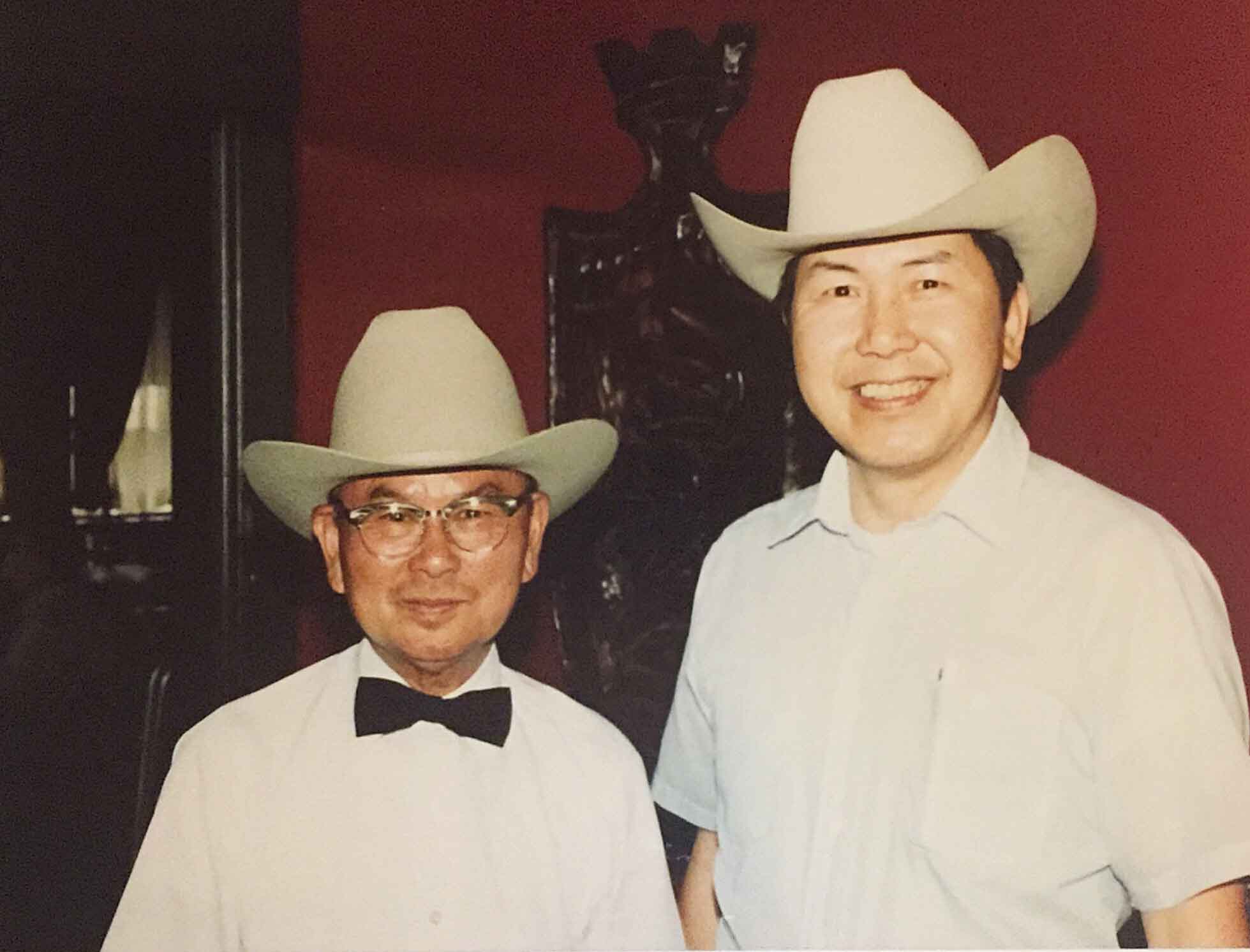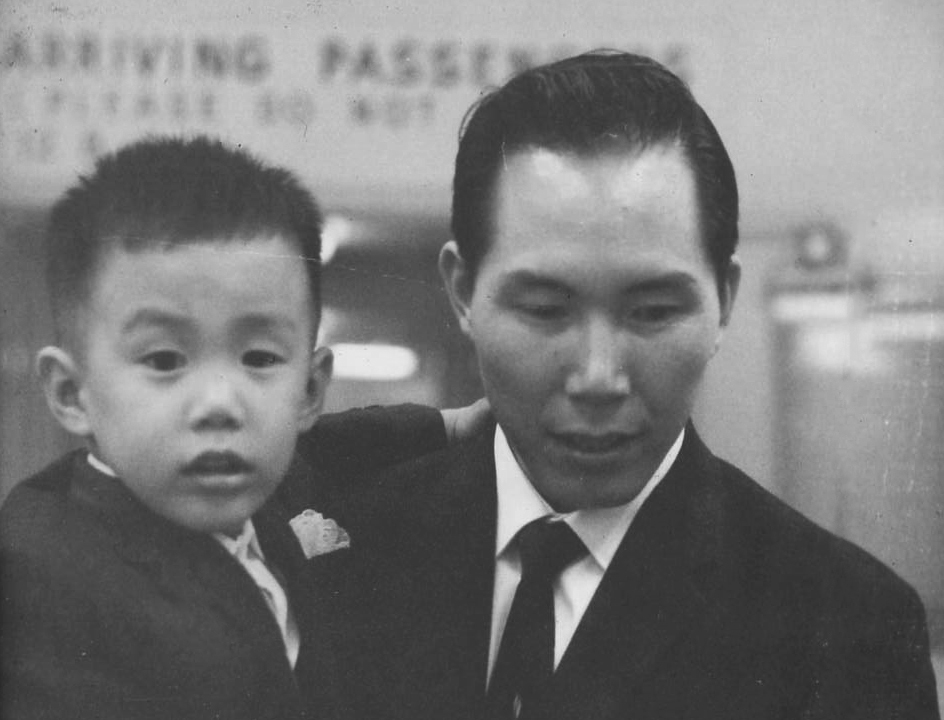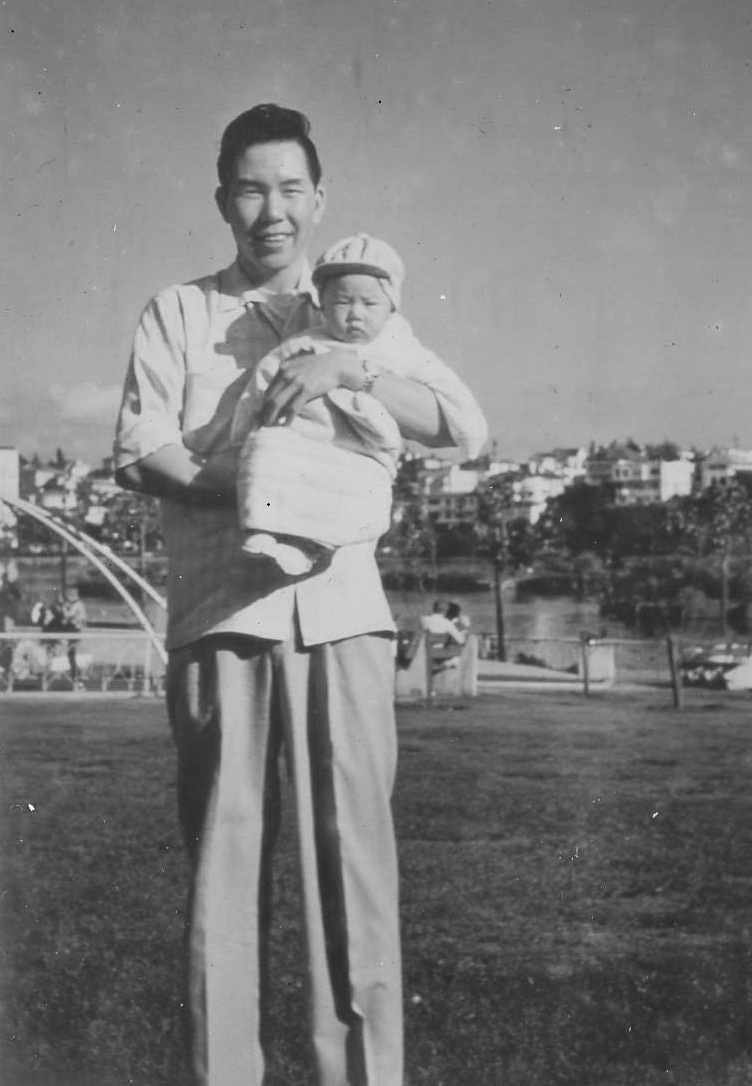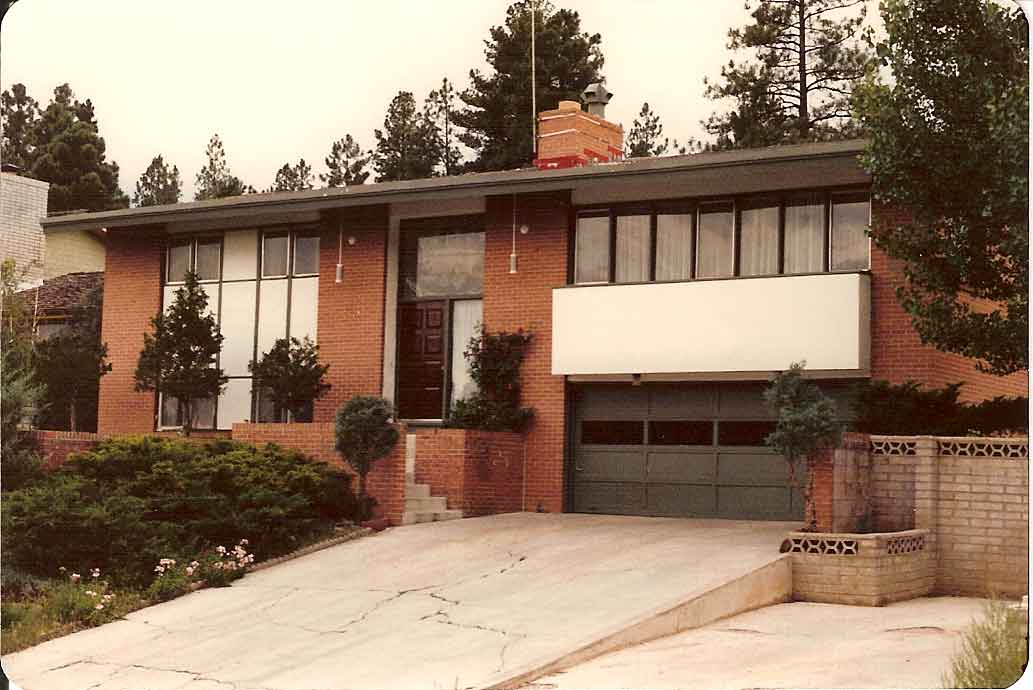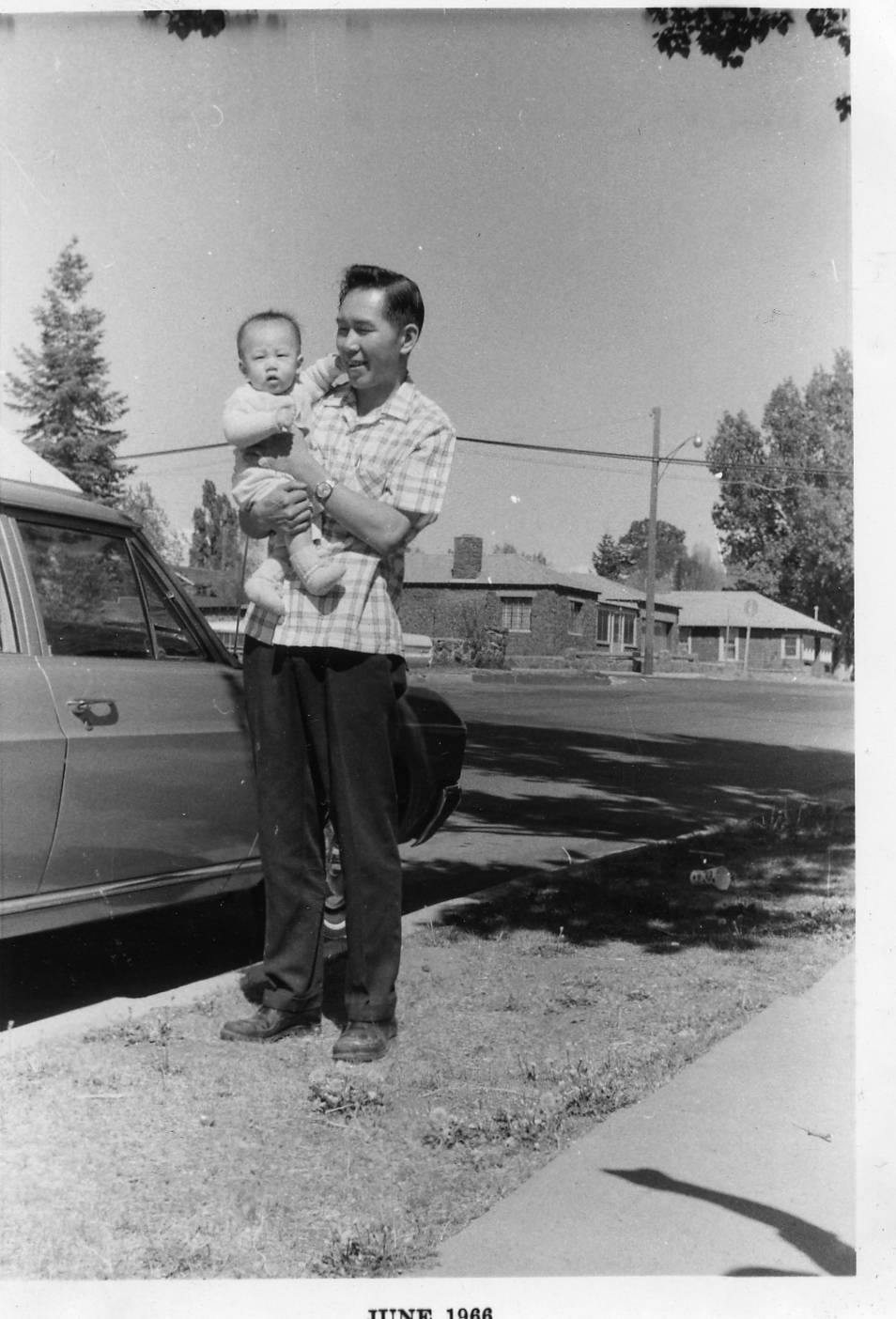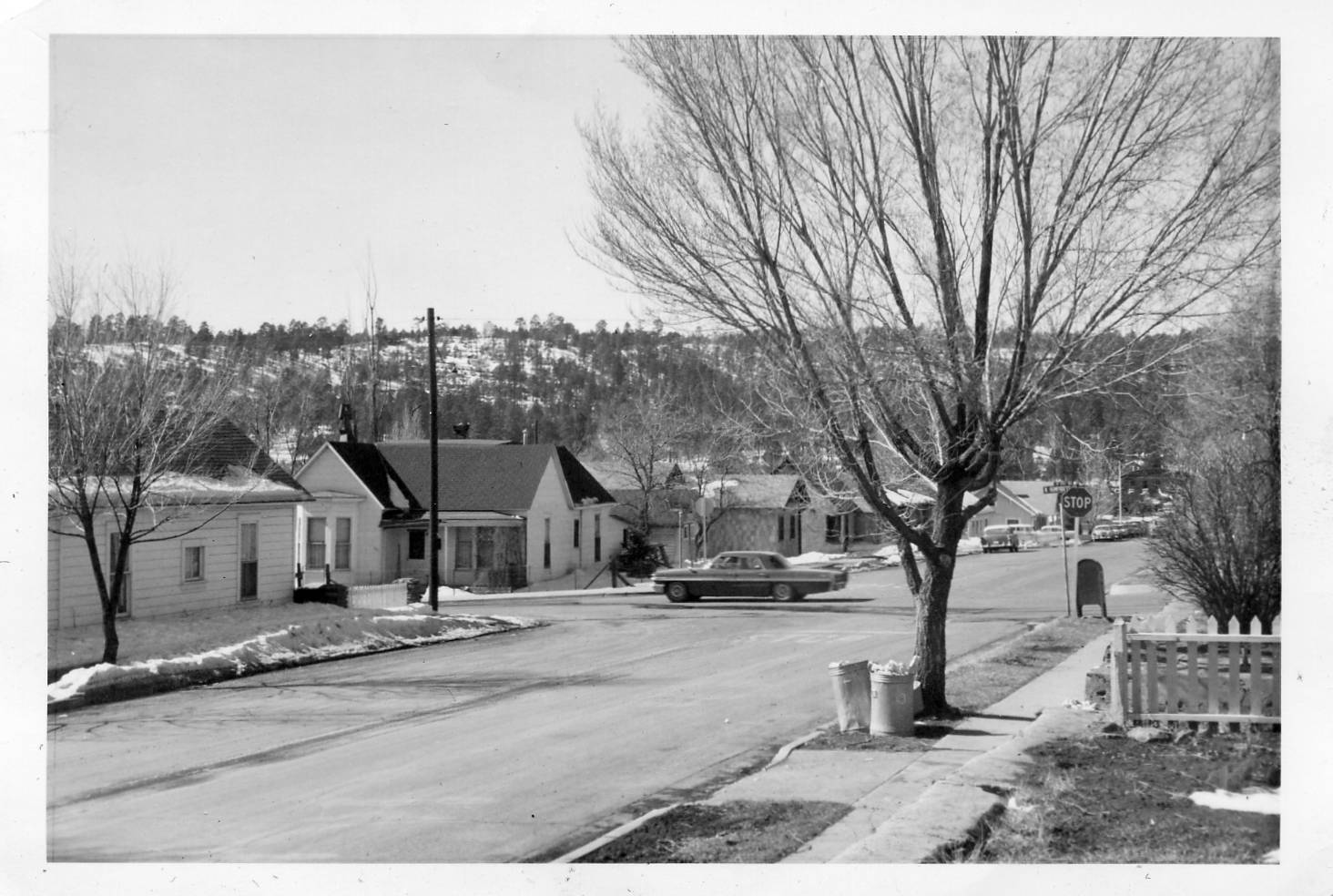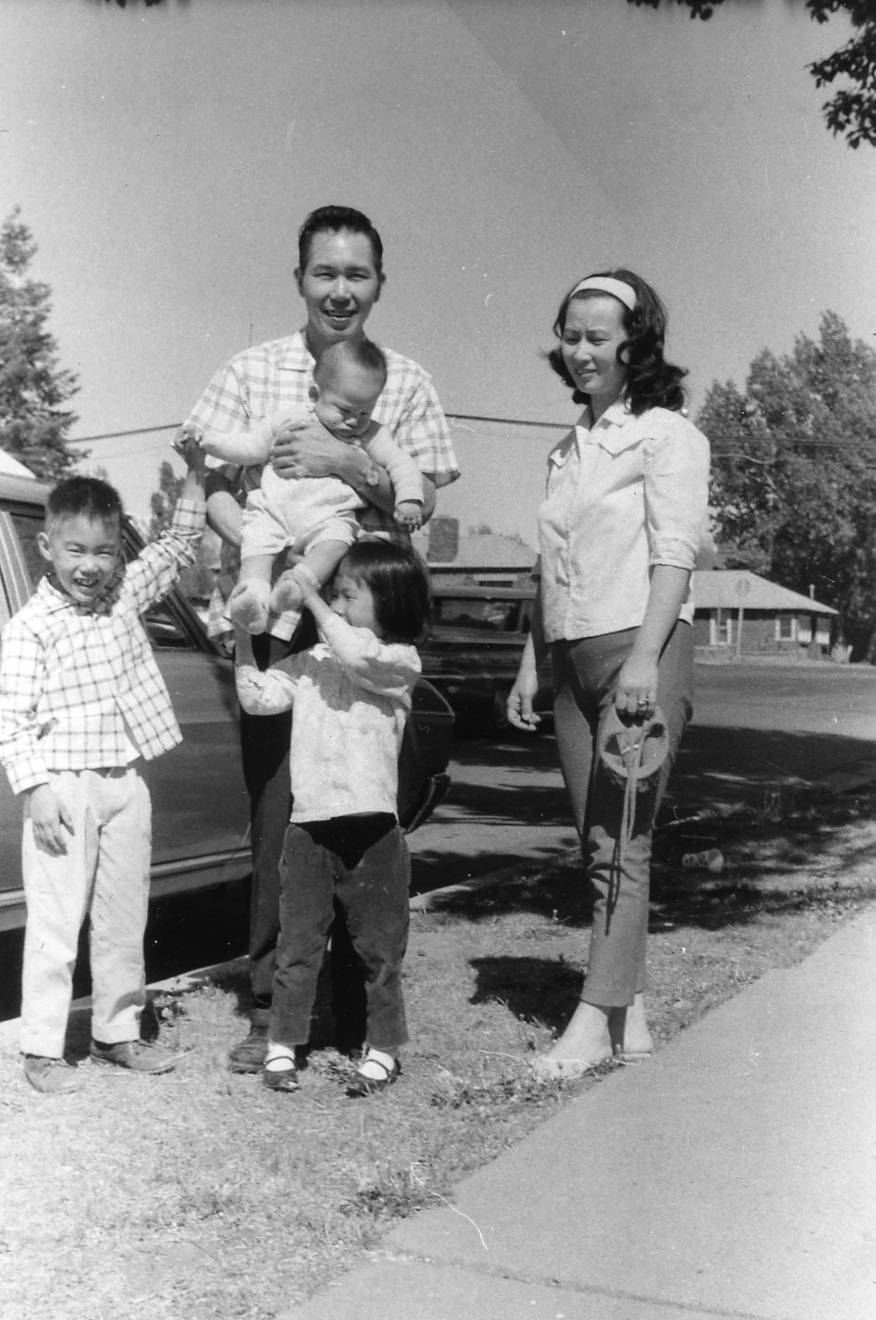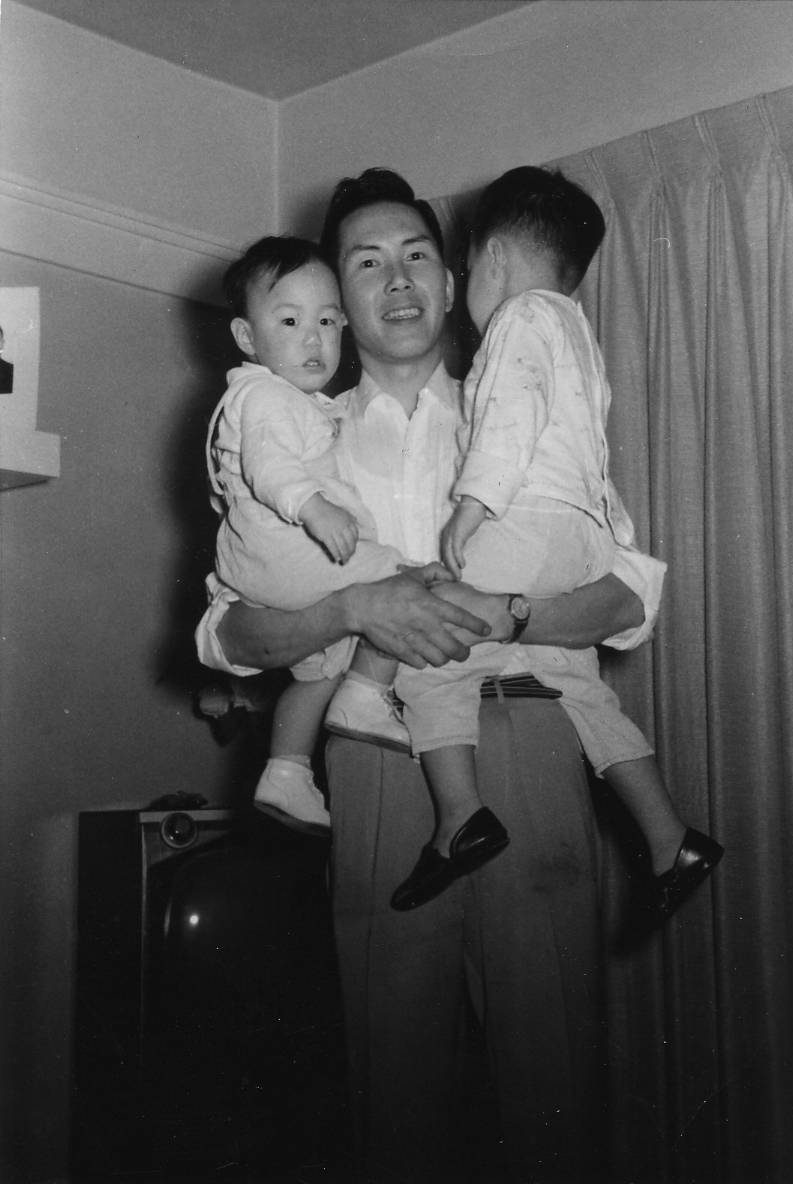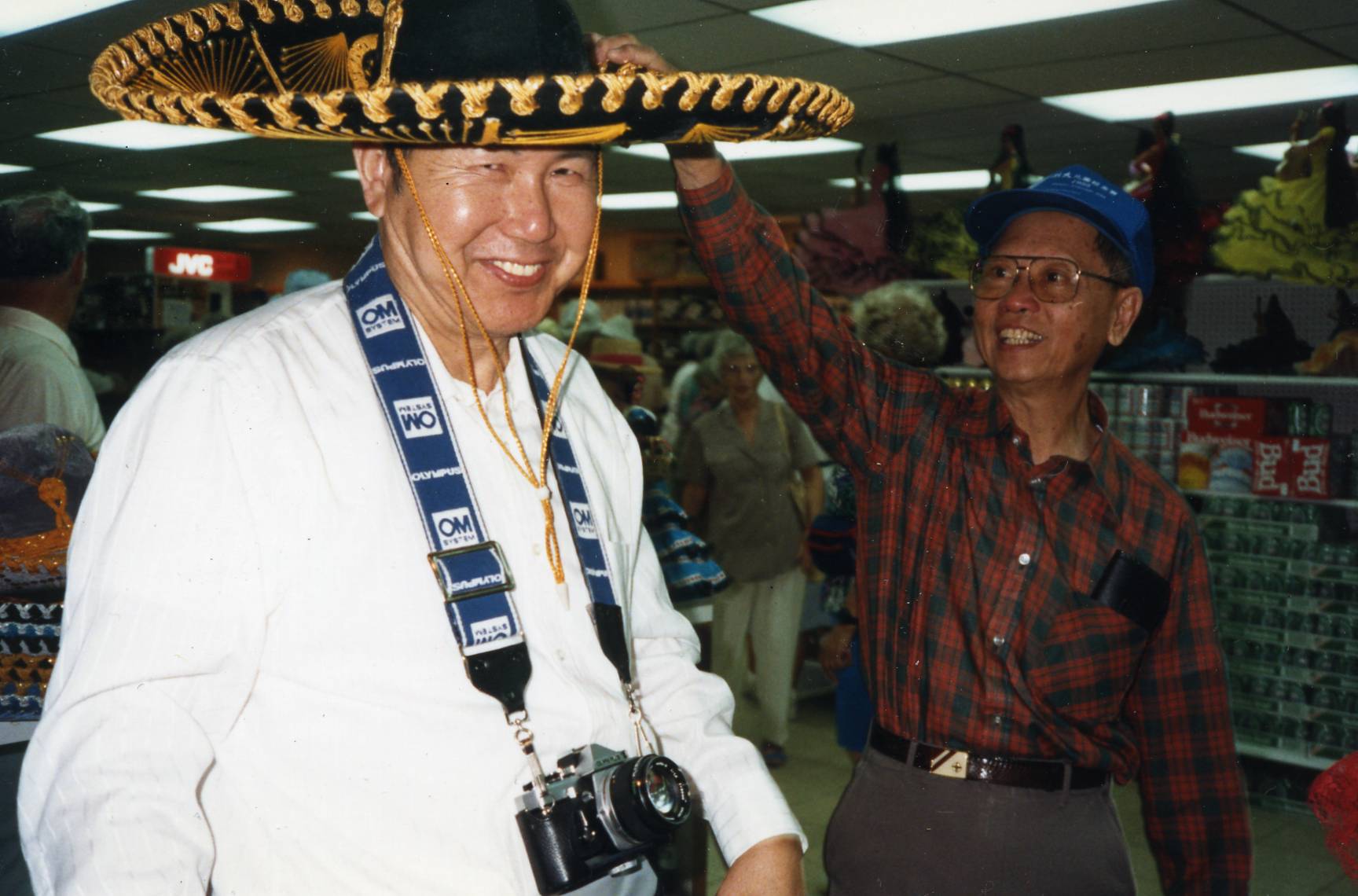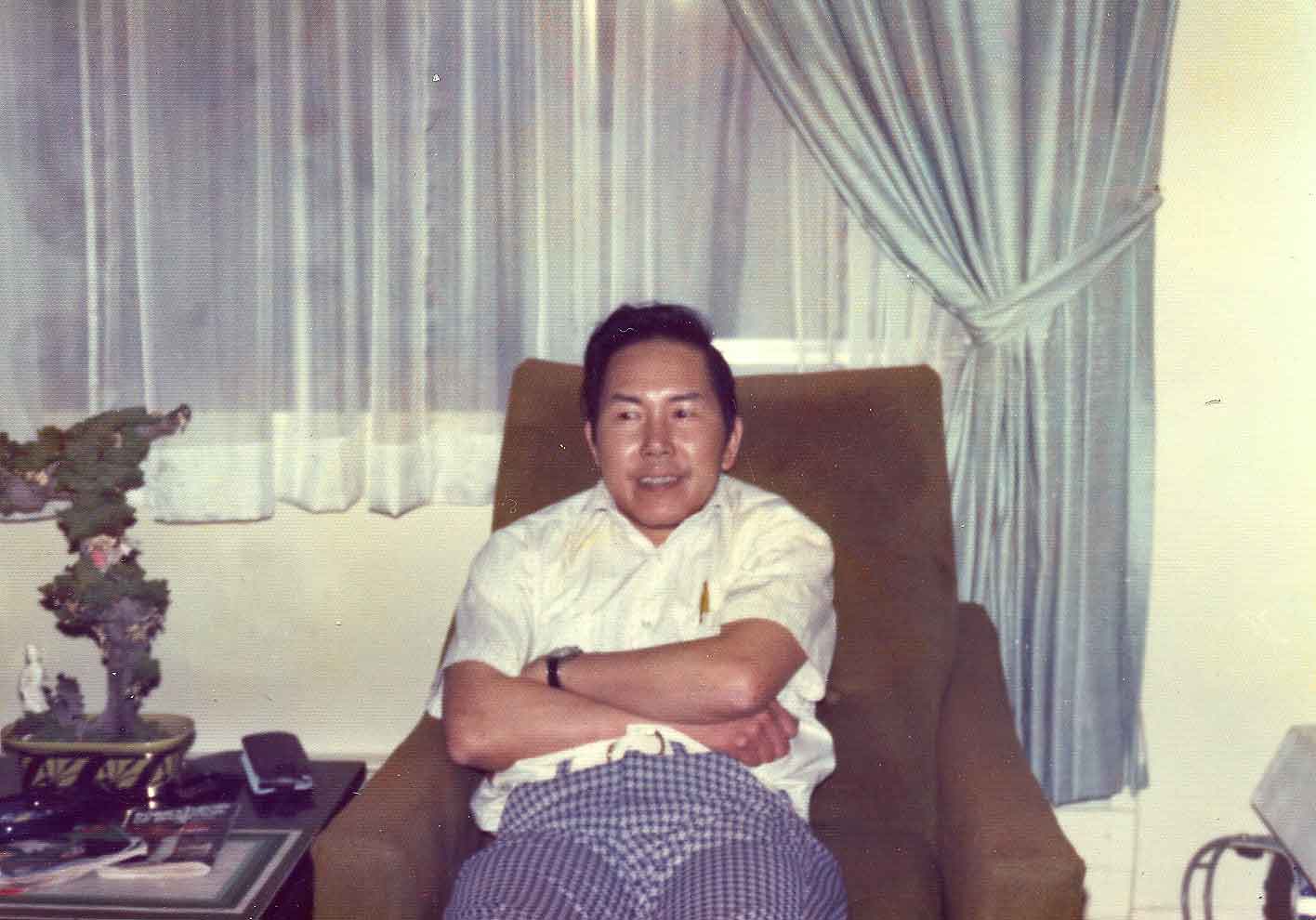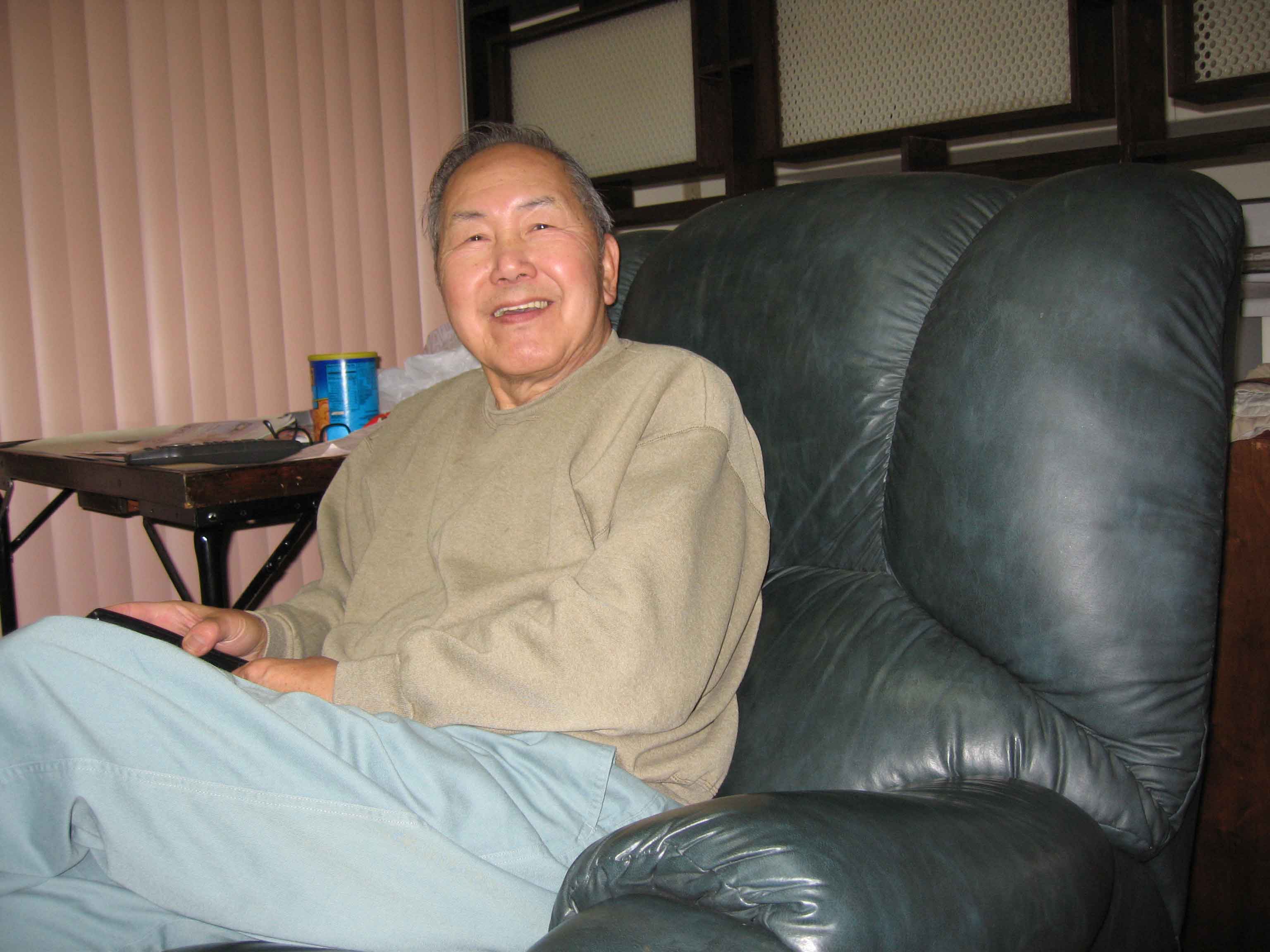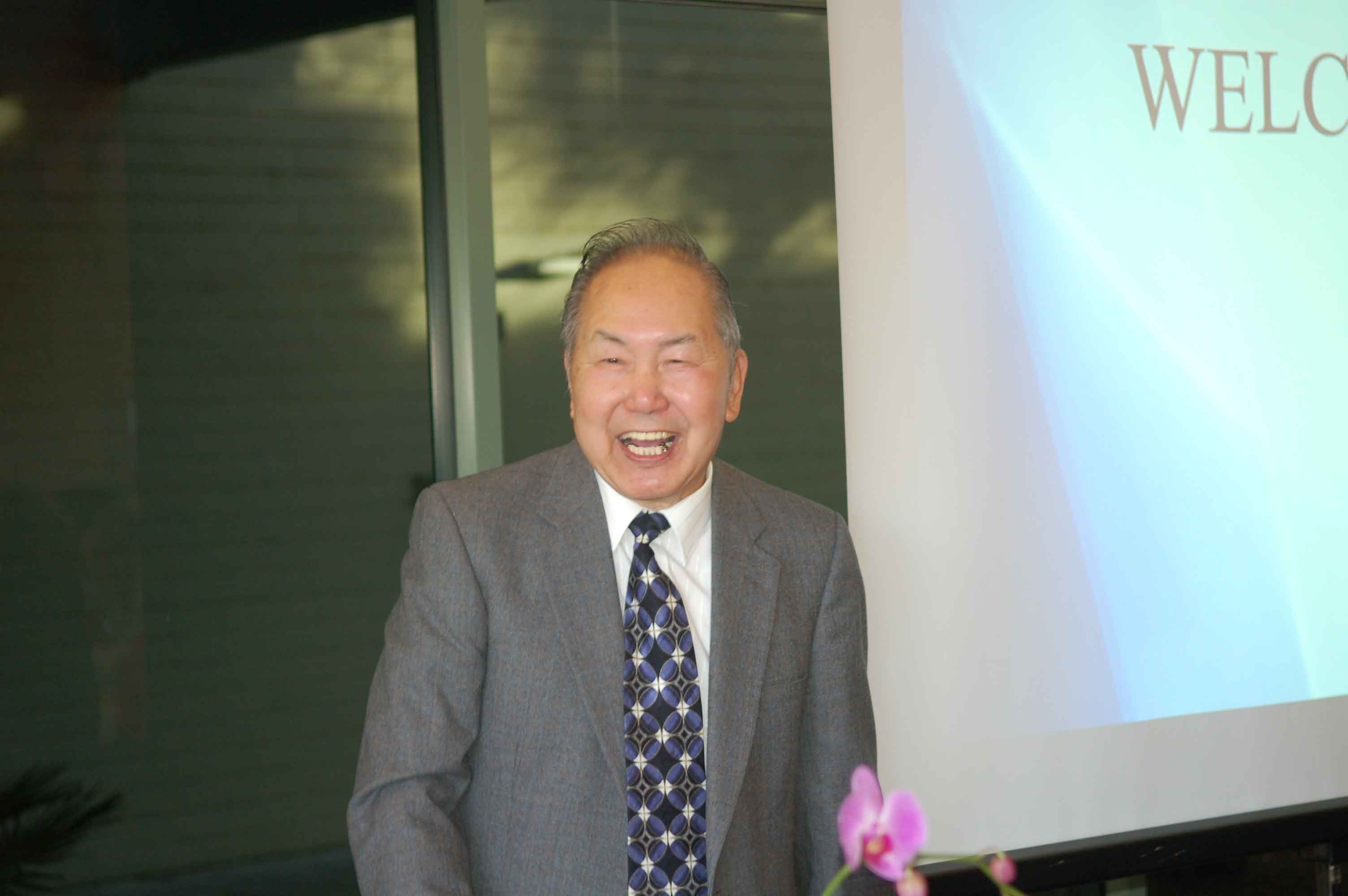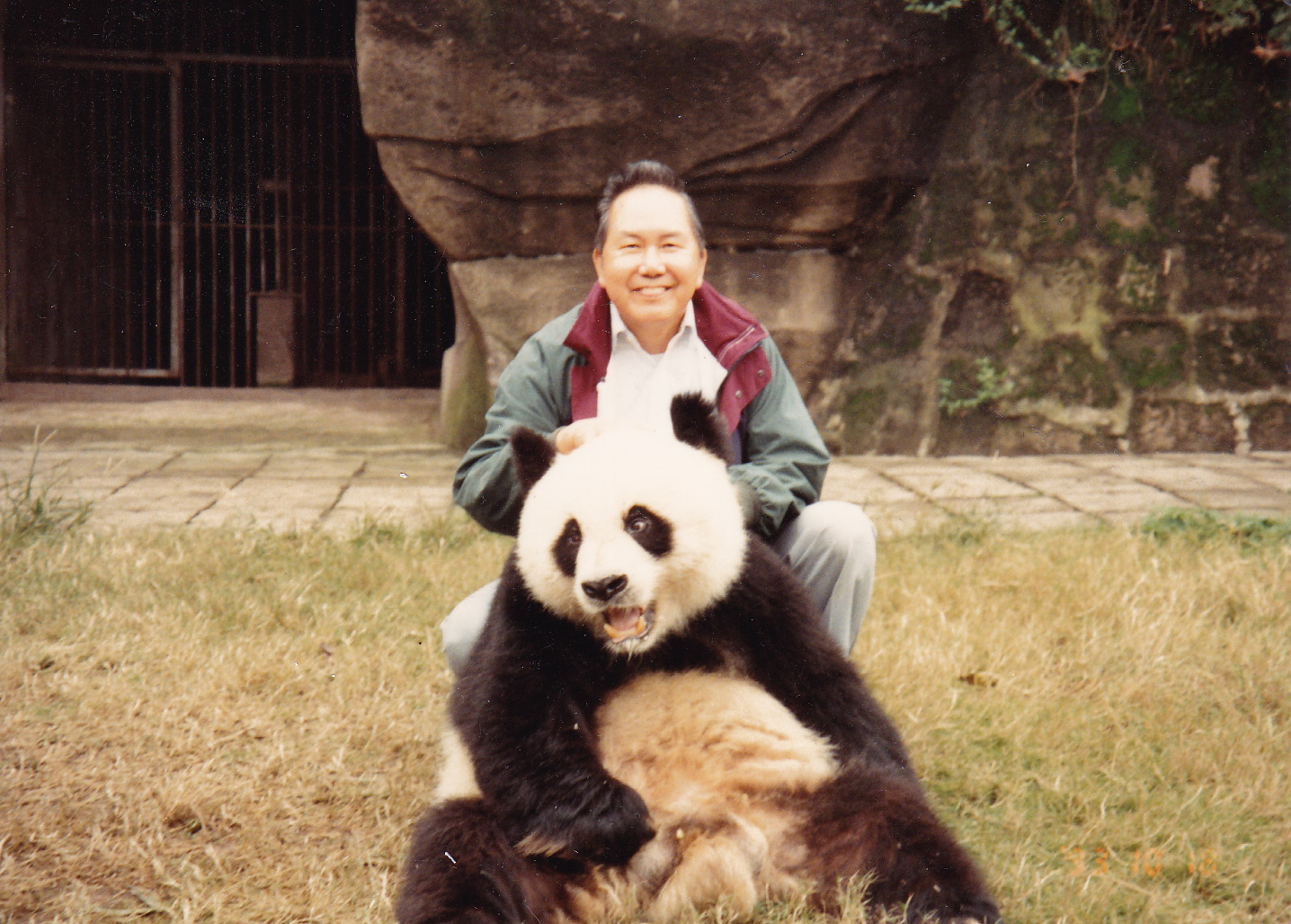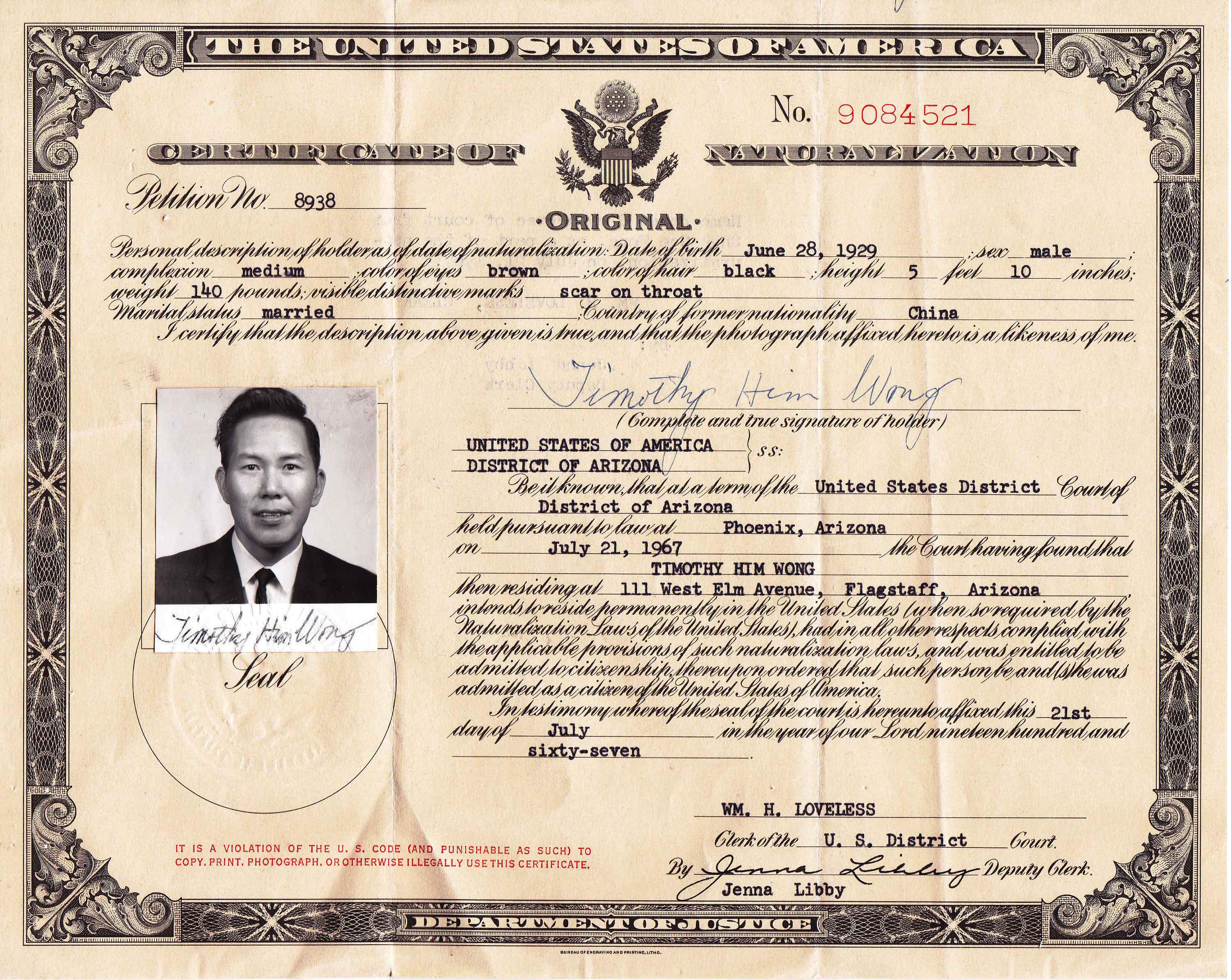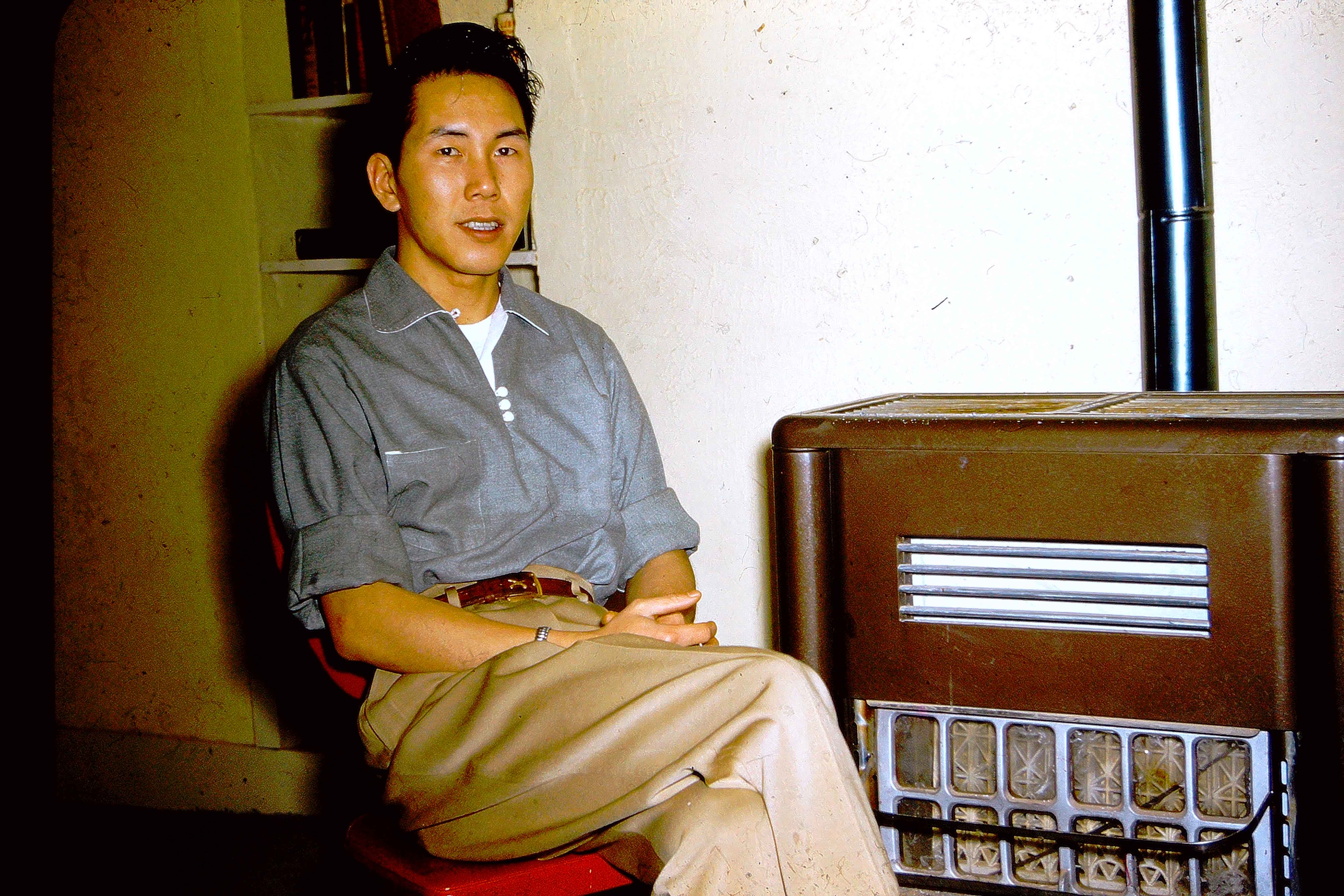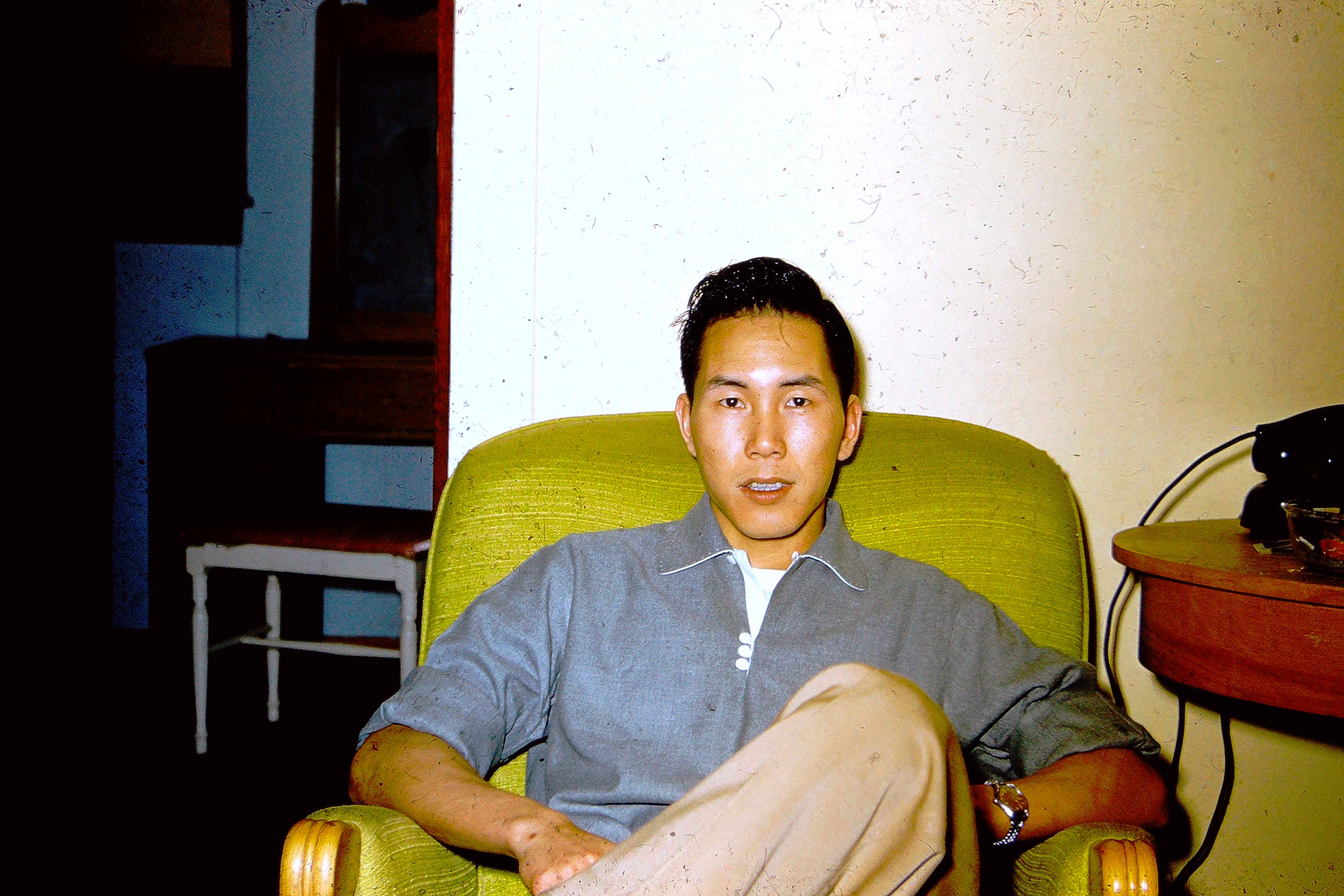
A New Beginning

In April of 1948, Him Thoon set out to make the journey across the ocean from Hong Kong to a new country and a new beginning. The trip would last twenty days. He would be forced to stay in the San Francisco detention center for five months before his release. Finally, after successfully answering the immigration officers' questions, they approved his release. For the first night, he slept on a park bench in Chinatown and was able to eventually get in touch with a friend, who helped him get a job working as a dishwasher at a local restaurant. He lived in San Francisco for a few months before moving to Winslow, Arizona, to work for his sister, Emily, and brother-in-law, Henry, at a Chinese food restaurant they owned. Even though he was not the most studious person, he attended Winslow High School for two years, learning English, making friends, and getting into fights. Him Thoon embraced the United States as his new home and wanted to acclimate into the American culture as much as possible without losing his Chinese heritage. He changed his name to Timothy.
From Dishwasher to Cook
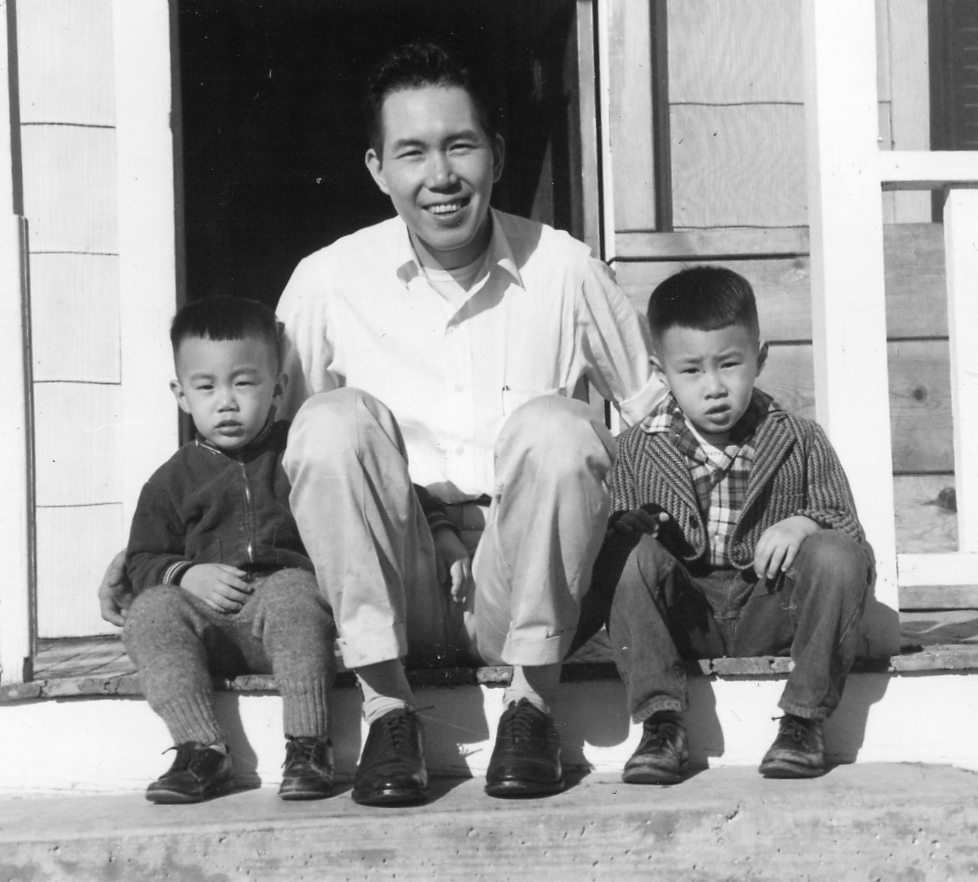
Under his brother-in-law's tutelage, Him Thoon began learning how to cook, which he eventually put to good use later on when he would start his own restaurant. He worked for his family for two years, eventually paying off the $500 owed to his sister for the immigration papers. In 1951, he moved back to San Francisco and worked as a fry cook at the Four Acres Cafe for a year before being drafted in the US Army.
Life After the Army
After serving almost two years in the army, with only months from being discharged, Him Thoon met and married Lee Wai Ying in Hong Kong on August 17th, 1955. Upon discharge from the army, Him Thoon went back to Hong Kong and brought his wife over to the US to begin their new life together. He chose to make their home in Oakland, California, the area where her father had been living and working for ten years. To embrace the new culture, he decided to adopt an American name and thereafter to be known as Timothy, or Tim, as his friends would call him. Not content with working for others, he entered into a partnership with a friend and co-owned The Cathay Room in Oakland. The next five years saw the birth of two sons, Phillip and Peter, and a daughter Jennifer, to Timothy and Wai Ying, now known as Lillian. Days were spent working at the restaurant, raising his children, and playing mahjong after the restaurant closed into the early hours of the morning with his friends. In 1961, his aunt Emily and nephew contacted him and offered him a partnership in a new restaurant named the Golden Star located in Flagstaff, Arizona. This would mean going back to Arizona, but the prospects of a growing city meant more opportunities for Tim and he couldn't pass it up. He packed his family in the car on a hot summer day and drove the thirteen hours to their new home. He co-managed the Golden Star for the next five years, all the while nurturing the idea of owning his own restaurant and creating his own menu. In 1965, he saw an ad in the local newspaper of an open lease to the Afton House Restaurant. The restaurant was located on Route 66, next to the Best Western Pony Soldier Motel. Both properties at the time were owned by Albert Choules. As a young man in Oakland, Tim was a witness to racial segregration, from bathrooms with signs "For Whites Only" to restaurants that only served "Whites." As a naturalized citizen, he didn't feel he had the power to question the inequality, and fortunately, he never experienced any violence towards him for being Chinese. The only outright show of racism directed at him was from a real estate agent. The agent refused to sell Tim a house in Oakland because he was not Caucasian. His reaction - he purchased a house in a different neighborhood with a different realtor.
"Where American Food is an Art, Chinese Food a Specialty"
The Businessman
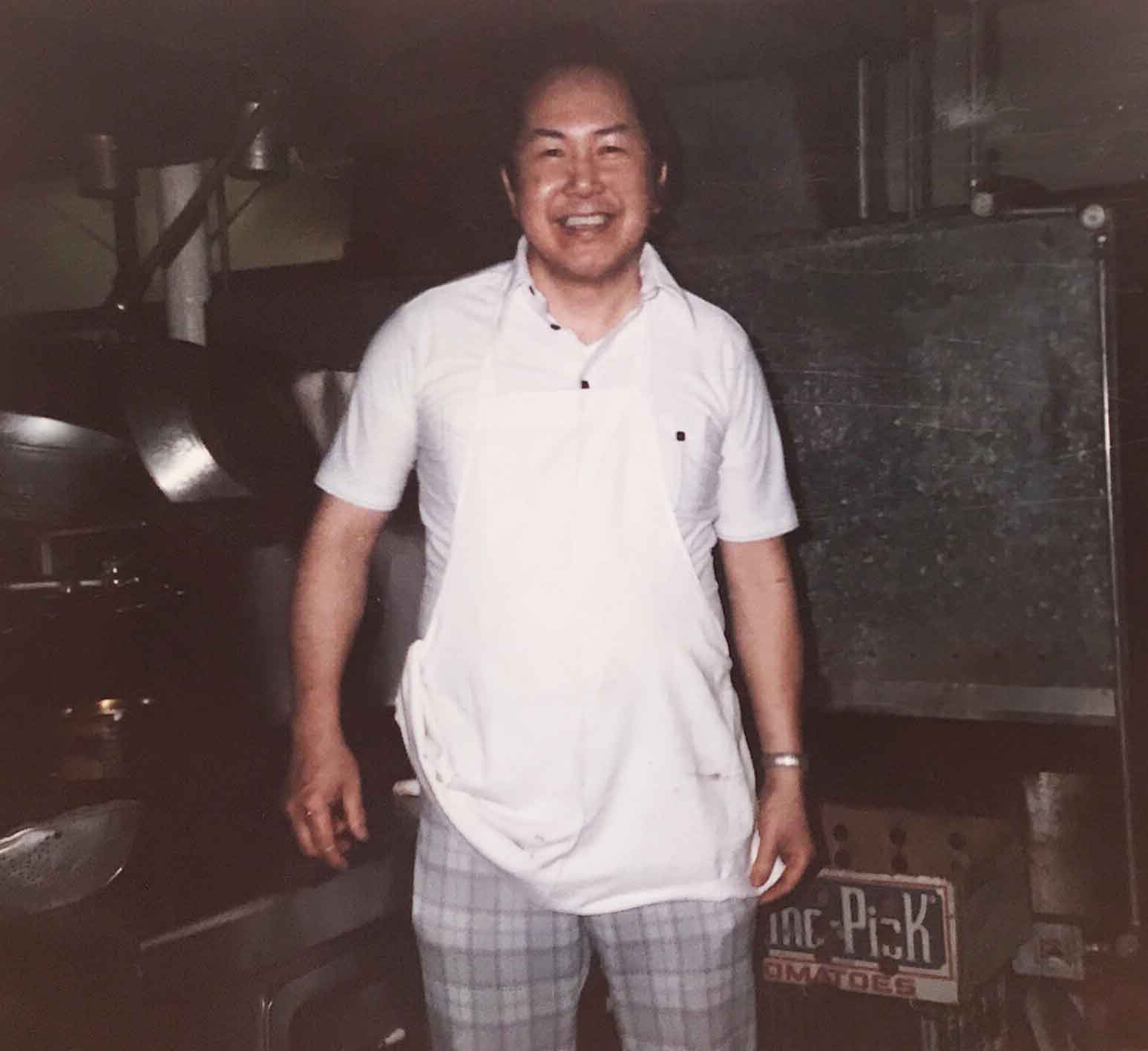
Opening the restaurant was both exciting and terrifying for Tim, but because of the work ethic he learned in China, and his desire to become something better, he willingly took the leap into the unknown. Also in 1965, his third son, Larry, was born, followed by a daughter, Beverly, in 1968. During this time, he utilized his previously learned cooking skills to create a fabulous menu, combining both Chinese and American food under one roof. Tim was a natural entrepreneur; he was able to bring in the leading businessmen in town, develop the Afton House into the number one Chinese Food restaurant in Flagstaff, and build customer loyalty. He even created the restaurant's slogan: "Where American Food is an Art, Chinese Food a Specialty." He was able to enter into a contract with the Rotary Club, Kiwanis Club, the Exchange Club, Shriners, and the Optimus Club to hold their meetings and lunches at the restaurant on a regular basis. Some of the leading businessmen would meet daily for lunch and eventually dub their group "The Wild Bunch" with Tim being one of the members. Owning his own restaurant gave Tim the ability to freely create dishes on how he felt they should taste. His family would find out years later that he had entered in his recipe for Paradise Drums of Heaven (a popular dish on the Afton House menu) in a New York recipe contest and won first place. As the business grew, he realized that he couldn't manage both the dining room and the kitchen by himself and would eventually bring in his father-in-law, Nging Pie Lee, as a partner. Mr. Lee, as the customers fondly called him, was also a natural at welcoming customers into the establishment. They would continue as co-owners for several years until Mr. Lee retired. When Mr. Lee stepped down, Tim's second son, Pete, was brought in as co-owner. The business continued being successful with Tim running the kitchen, and Pete in charge of the dining room and ensuring the customers were well taken care of. The years saw the restaurant undergo many changes in employees and expansion, however, it retained its unique menu and welcoming atmosphere. Locals who were repeat customers would eventually become part of the family; they would always be present during Wong family celebrations: weddings, graduations, birthday parties, etc.
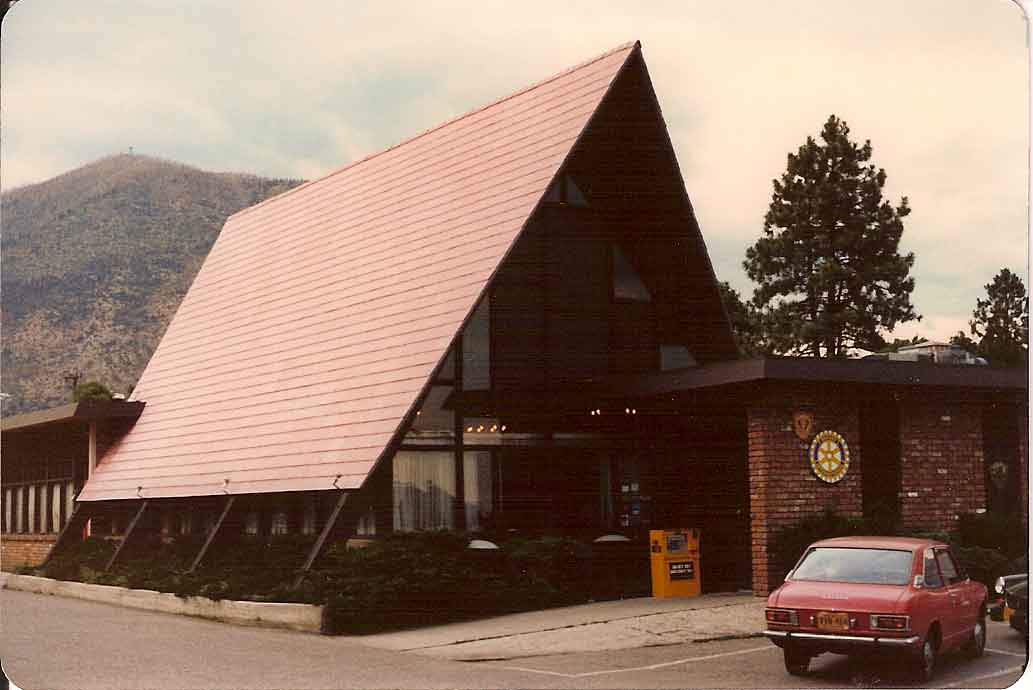
Being an American
For Tim, being an American was extremely important and a privilege. Coming from a communist country and witnessing the atrocities committed by the Japanese, freedom to him was a gift. America was the land of opportunity and he worked sixteen hour days, seven days of the week to achieve his dream. Because he purchased fraudulent papers, he was always afraid the government would find out and deport him back to China. However, in 1956, the Immigration and Naturalization Service (INS) department of the US government began the Chinese Confession Program. This was essentially an amnesty program where people could confess they had claimed non-existent family relationships and would then have the opportunity to obtain immigration status legally. Taking the chance that the US government would deal with him honestly, and also the fact that he had served the country in the military, Tim legally registered his status. On July 21, 1967, Tim received his Naturalization papers and became a United States citizen. On August 21, 1967, he officially changed his and his family's last name from Gee to Wong. He became a staunch Republican and voted in every election, whether it was a major or minor election. Sometime after moving to Flagstaff, Tim became a huge NFL fan. He would follow the football season religiously until the day he would pass away. He would never miss a single game; the invention of the VCR was most likely one of the most important events of his life. His family knew to not speak to him except during commercials if he was watching a game on the television. Not only was he an avid follower, he loved to place football bets. The annual football pool at the restaurant was a religious experience. Tim was a risk taker, and he was also a gambler, a conservative gambler, but a gambler nevertheless. The stock market captured his interest early on, and he became a self-taught investor. In the beginning, he would lose money, but he quickly learned from his mistakes and went on to become a successful stock picker. He was a gambler, but he never made an investment without doing the research first. He also knew financial wealth could be gained in owning property, and as soon as he could afford a substantial business loan, he purchased his first set of apartments in Flagtaff on 6th Avenue. Eventually, he would buy a second set of apartments on West Street. He would always emphasize the importance of being an American citizen and he taught his children to always pay taxes and never complain about paying taxes.
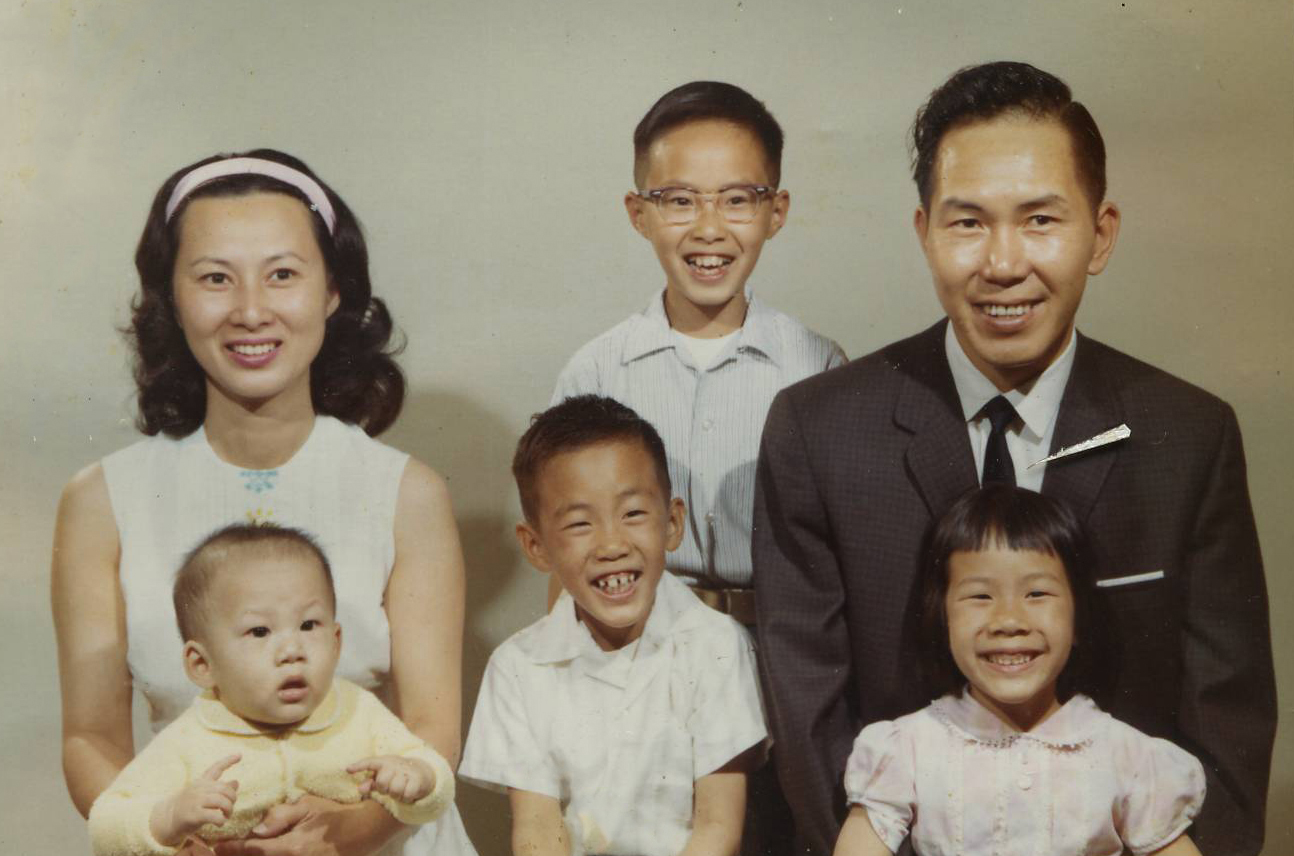
L-R (bottom) Larry, Peter, Jennifer
A Passion for Life
Tim took up fishing and hunting shortly after moving to Flagstaff. He had a passion for fishing - he would make and tie his own fly fishing lures, carefully painting life-like eyes on all of his doll flies. In his lifetime, he owned four boats, three of which met with bad endings. The first boat was being towed on the highway by his friend and slid off the trailer en route to Phoenix. The second boat was parked in a dry dock in Page, Arizona, and the neighboring wall fell on it and demolished it. The third boat overturned in a surprise windstorm while parked in a cove at Lake Powell. Tim, Lillian, and three of their children were in the boat at the time. Lillian was flung out of the boat and Tim was able to swim to her and bring her to shore. Their children were trapped underneath the boat. Jennifer, who was a teenager at the time, was the only one who knew how to swim. She dove down to Larry and Bev, who were both sinking, and dragged them up to the cabin where a pocket of air was created from the overturned boat. All of the boaters that had docked in the cove pitched in to anchor the boat to shore so it would not drift off with the children in it. After a few hours, they flagged down another boat whose owner happened to have a hand ax. They cut a hole in the bottom of the boat and pulled the children out and to safety. After this last incident, Lillian put her foot down, forced Tim to sell the boat, and told him he was never allowed to purchase another one, which he did not. Tim also loved hunting, particularly doves. He would always go with a family friend or his son, Pete. They would set off in the early morning hours and bring home a brace of pigeons by the end of the day for Lillian to prepare for dinner. On one of his outings, he shot a dove, but only clipped the wing instead of killing it. Instead of shooting the injured bird, he brought it home and let his two youngest children care for the bird. Once the bird was healed, they set it free. Tim collected cars like he collected boats. He would eventually own twenty-eight cars during his lifetime. In the beginning of Tim and Lillian's marriage, money was always tight, so Tim was forced to learn how to fix things that broke. He became a self-taught handyman, being able to fix most appliances and build almost any type of furniture. His one pride and joy was a mahjong table with four drawers. Tim embraced new technology instead of rejecting it as many of his contemporaries did. He always had multiple televisions and VCRs. It didn't make a difference how complicated the VCR, Tim was somehow able to learn how to work it, and he never missed a football game...ever. He bought the first Motorola flip phone and he bought his first computer in the 90s. He would use the computer to check stocks, football stats, check bank accounts, play mahjong, and read the Chinese news. Even in his last months, he would be in front of his computer.
Leaving a Legacy
In 1996, Tim made the decision along with his son Pete, to close the restaurant and retire. Working those long and hard hours were finally catching up with him and he wanted to begin enjoying life without having to worry about the restaurant. He was tired and he wanted to spend more time with his wife and grandchildren. He would still be an avid NFL fan, dragging his wife to Laughlin to place bets, and he still played in the stock market. During his retirement years, he and Lillian purchased a house in Scottsdale, and they would split their time between Flagstaff and Phoenix. They would continue to travel, taking cruises because he hated to walk and he loved the food, visit friends and family, and cook. Days before the summer of 2013, Tim began complaining of not feeling well and dizzy. Lillian rushed him to the hospital and they discovered his heart rate had plummeted well below the norm. He was admitted into the emergency room where the doctors soon discovered a buildup of the medication, Metformin, in his kidneys, which was slowly poisoning his body. The effects of the Metformin resulted in increased heart failure and pulmonary hypertension; Tim almost died. The doctors quickly put Tim on dialysis to remove the Metformin and he slowly recovered. The hospital was amazed at his ability to bounce back, but his family attributed his amazing power of recuperation to Tim's strength of will and his knowledge that Lillian still needed him. He would move down to Phoenix to begin his rehabilitation and was never able to live in Flagstaff again. Rehabilitation was difficult for him, as he wasn't used to relying on people physically for assistance. However, with determination, physical therapy, and the support of family, he rebounded quickly. Tim was never one to complain and he never dwelt on the low times in his life. Days before Christmas of 2016, Tim's health would fail again and the doctors prepared the family for the worst. He was sent home under hospice care and he was able to spend his last Christmas surrounded by family. His last Christmas Eve dinner was spent with his wife and children reminiscing about the restaurant days. There was a lot of laughter and he was able to tell a few stories of his own. On January 4th, 2017, Tim gave one last hug to Lillian and passed away peacefully, lifting his eyes and arms up to Jesus. Right before the end, one of his daughters asked him if he had any regrets about his life, he emphatically said, "NO!" Asked what his greatest accomplishment was, he stated, "Marrying your mom."

